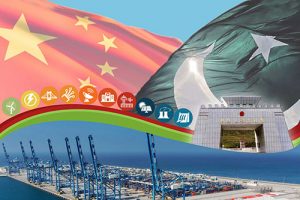On paper, the China-Pakistan Economic Corridor (CPEC) is apparently on track, but background interviews with some top Pakistani officials reveal that progress on this all-important economic lifeline for the country has slowed down since the Pakistan Tehreek-e-Insaaf (PTI) government assumed power.
“The grand vision of CPEC has certainly been weakened,” maintains a senior government official, requesting anonymity. “The pro-American lobby moved with speed in the initial days of this government, selling the western propaganda to the prime minister that Chinese loans would land Pakistan in a debt trap. This government also tried to reopen and renegotiate the done deals, which has not gone down too well with our Chinese friends.”
Sources say that there have been efforts from Pakistani’s side to restore China’s confidence since then, but apparently this set-up has failed to fully revive the trust of our Chinese friends.
One key problem is Pakistan’s ruling elite’s slavish mental dependence on the West, particularly the United States, with whom they wish to remain allied, even though the strategic interests of the two countries do not converge anymore.
With the United States supporting and equipping India in an attempt to prop it up as a counterweight to China in the region, Pakistan’s interests and security are directly being threatened. Yet, under pressure from the United States and its Arab allies, even a section of the Pakistani establishment has softened its tone on India. This softening of tone and unilateral flexibility on India has created a lot of unease at various tiers of the government and the establishment alike, forcing Prime Minister Imran Khan now to repeatedly say no talks with India until it revokes its August 5, 2019 steps in Occupied Kashmir, which scrapped even the nominal autonomy given to this disputed region.

The Americans want to establish India as the policeman in the region and is trying to force Pakistan to distance itself from China. But fortunately, as open betrayal of the Kashmir cause is not possible in the public sphere in Pakistan; similarly, a policy shift on China will also prove to be a highly unpopular move, which no government can afford.
Therefore, the small but influential pro-West lobby in Pakistan, has not been fully able to stall the CPEC, though it did manage to slow it down.
Prime Minister Imran Khan, who along with the Army Chief Qamar Javed Bajwa, is already being accused of not doing enough on Kashmir, can hardly afford to see Pakistan’s relations with China nosedive under his watch. That would be the undoing of his politics and legacy that is, if he wants to leave one.
The Prime Minister needs to focus on rebooting the country’s relations with China on a war-footing and alongside, giving the much-needed impetus to the CPEC as well. Pakistan’s close relations with China are in its best national interests. All through their post-independence history, China and Pakistan have proved each other’s all-weather friends and have stood by each other like “iron brothers.” This relationship should continue and be expanded rather than contained or damaged.
Pakistan’s leadership should not live in any delusion that the United States would help secure a fair deal for the country on the protracted Kashmir dispute or settle other issues with India. Even when Pakistan enjoyed the best of relations with the United States — in the 1950s, the 60s and in the 80s — Washington never came up to Pakistan’s expectations. And now with India as its strategic partner, the two countries are working hand-in-hand to transform Pakistan into a pliant state, ready to compromise on all its red lines. On Kashmir, India has already scored a huge success, with no response from Pakistan other than empty statements.
In the next phase, Pakistan should brace itself for tremendous pressure on its nuclear programme. It is imperative that Pakistan now focus on forging closer regional alliances, especially with China, rather than wasting time and energy in appeasing the West.
Prime Minister Imran Khan should also stay committed to his promise of denying any military bases or airspace to the Americans against the Afghan Taliban. There should be no confusion and ambiguity among Pakistan’s leadership that the country’s interests will not be served by dancing to Washington’s tune, which eventually would mean succumbing to New Delhi’s pressure. That would be a total negation of what Pakistan historically stands for.



